What's the 'best-kept secret' in aviation? Delaware State, how it produces pilots of color
His fabric-covered wings swung across enemy lines.
Bullets ripped through trees below, but Maxwell Honemond hugged the canopy, dodging birds like different enemy fire. It was his job to see.
Although he was armed with a .38-caliber pistol, his greatest weapon was more likely the aging radio fashioned far before 1943. The World War II observation pilot spotted for the Allies' ground artillery, watching where colossal rounds hit enemy positions to call back direction adjustments.
The American did this for most of his time in Europe. He would not see himself reflected in many of the soldiers he met during the war, and the second lieutenant would be greeted by systematic racism when he survived it.
Honemond was one of some 1,000 Tuskegee Airmen, the nation’s first Black pilots trained for war, and more than 350 such pilots deployed overseas. Their bomber escorts went on to set some of the lowest loss records of all fighter groups.
But this pilot’s journey started in a familiar place.
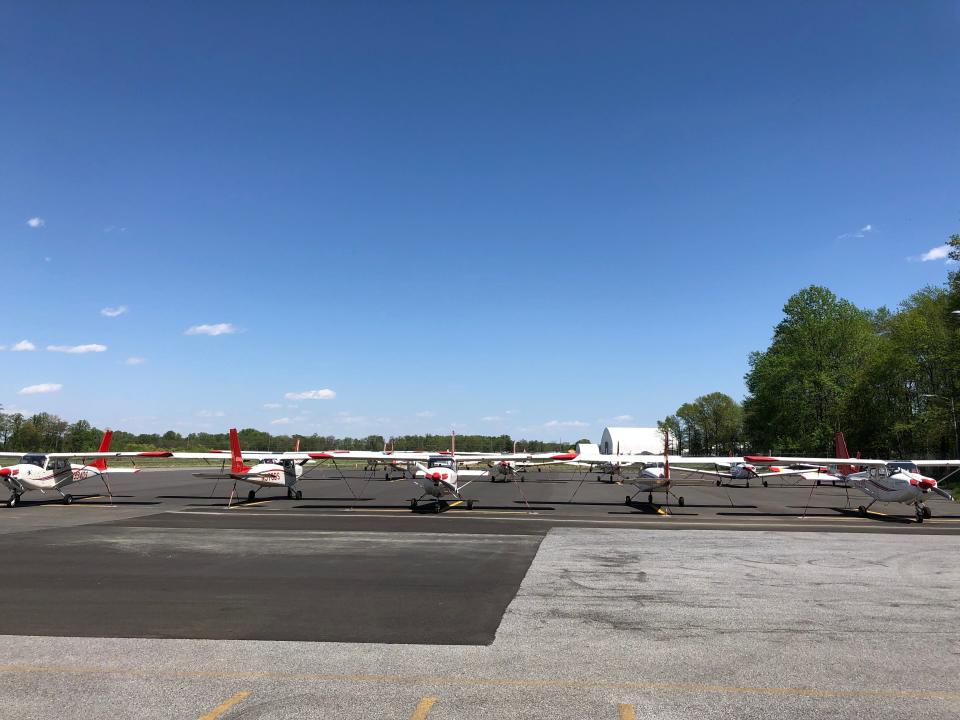
It started in a quiet corner of Dover, Delaware, with flight training offered to Black civilians for the first time in American history. It started with a late-1930s flight school that would set the tone for an entire program on the same grounds in the next century. It started at Delaware State University.
Today the quiet airpark hosts an aviation program graduating the most pilots of color in the nation, according to university President Tony Allen, with an outfit unlike any other among Historically Black Colleges and Universities. And from those grounds fastened with historic roots, it’s taking off like never before.
DSU Aviation has tripled since the 2016 appointment of retired Lt. Col. Michael Hales, director of DSU Aviation and 25-year veteran of the U.S. Army, Allen said.
See the machine: Helicopter training to take off for Delaware State's aviation program
He told that to a crowd gathered this month to hear Delaware State Aviation announce a partnership with U.S. Army Cadet Command. A first for an HBCU, helicopter flight training is set to join the professional pilot and aviation management disciplines. The Cabri G2 helicopters will share Delaware Airpark with a fleet of 26 university-owned planes, several flight simulators and a packed program.
The spring is expected to see one of the largest graduating classes. Then students will join a field with alumni already at every major U.S. airline — while a pilot shortage persists across the entire industry.
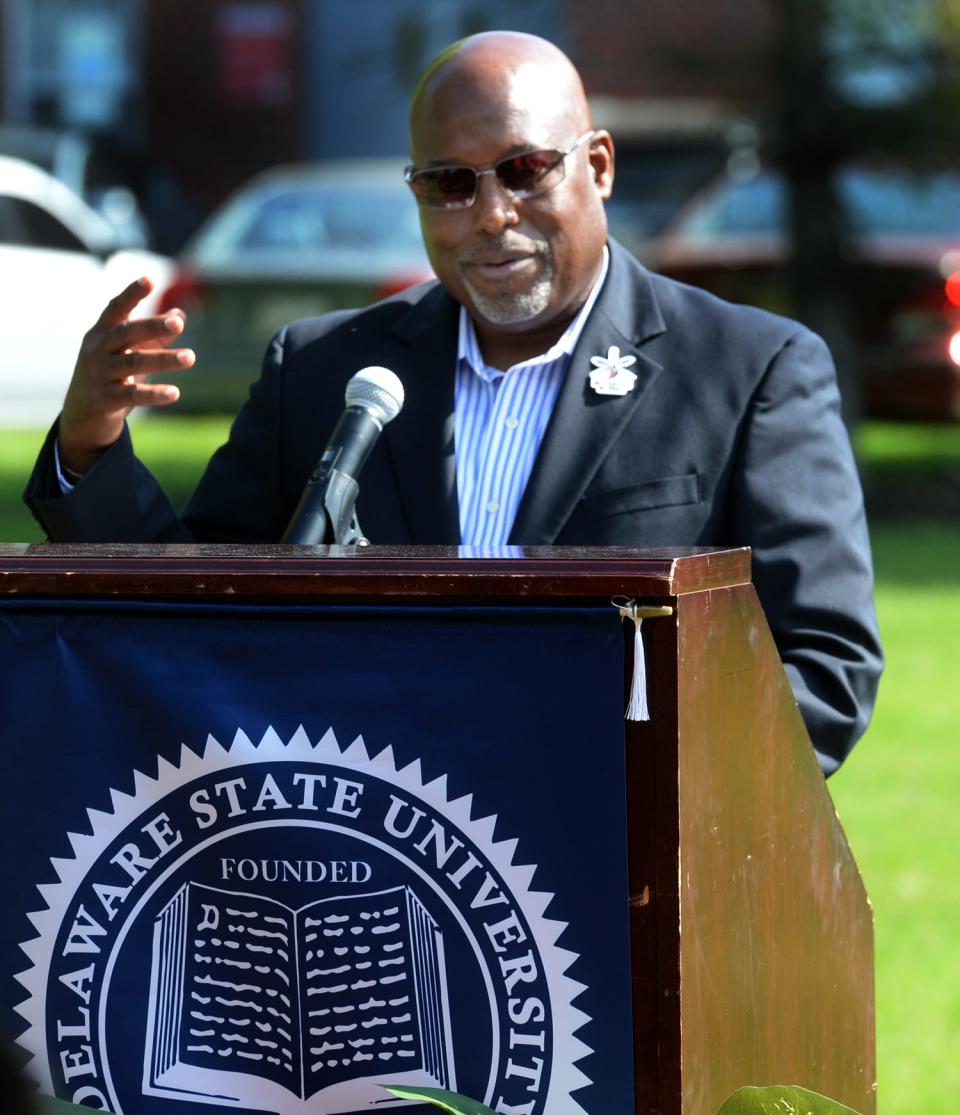
The year 1939 came with a different shortage.
The Civilian Pilot Training Act was signed as the United States reeled for more pilots ahead of a brewing world war. Under pressure from Black press and the NAACP, President Franklin Roosevelt would allow Black Americans to be included.
Six HBCUs answered that call, until the military consolidated the effort at Tuskegee University. Honemond and two other Tuskegee Airmen completed the civilian pilot training in Dover before reporting to Alabama.
For Delaware State, the mission continues.
'I wish I could have the power to fly'
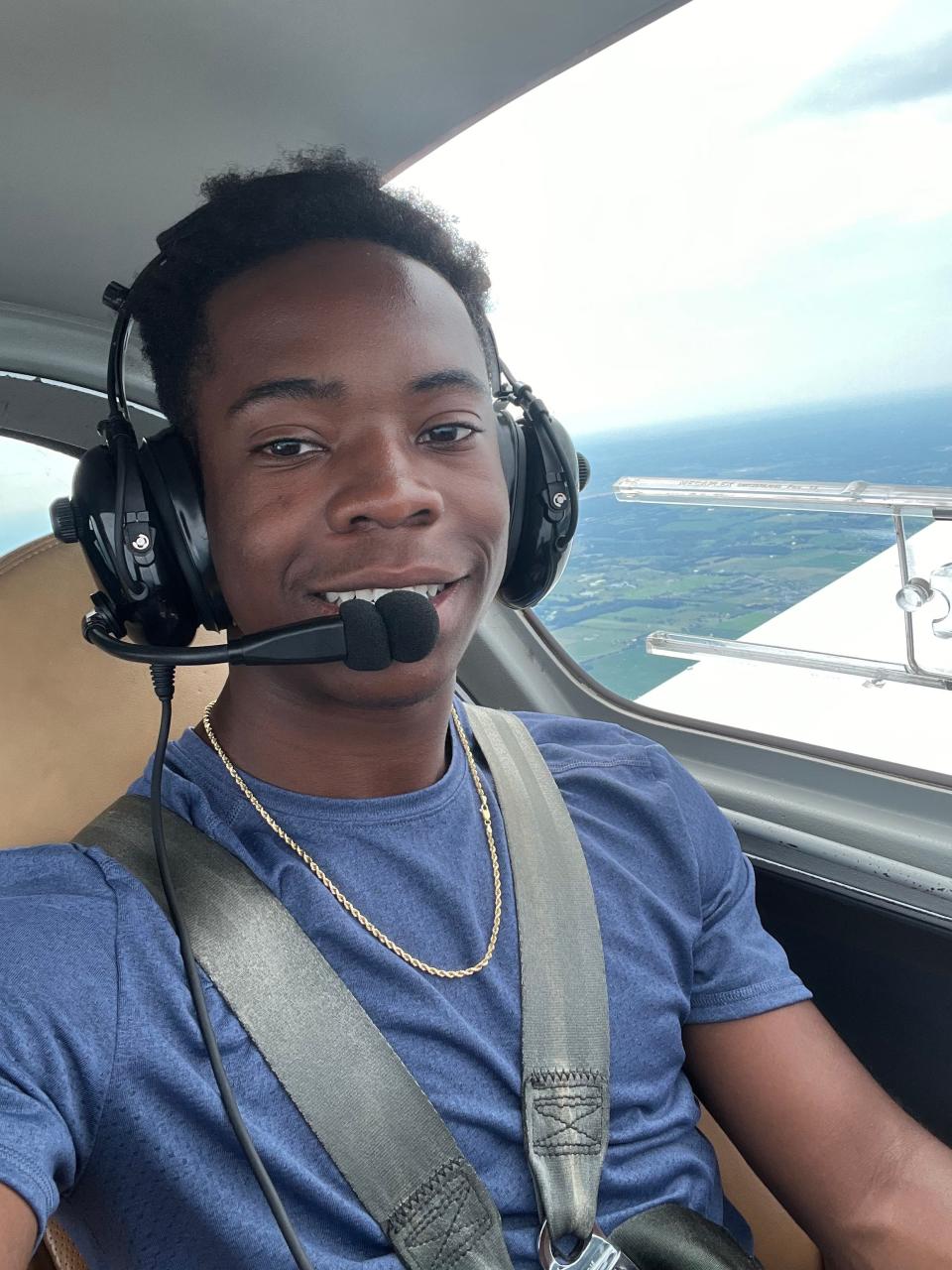
Multiple pillowcases hugged him tightly.
Two under him, another at his back, the pillows allowed 12-year-old Evan Knox to see over the cockpit’s instrument panel, reach rudder pedals and fly a Cessna Skyhawk. His dad’s job had the family flying across the country since he was 3 — but taking off from this Oakland County airport in Pontiac, Michigan, marked the beginning of his own training.
“It was such a crazy experience. It was so freeing and death-defying,” Knox recalled. Back in those moments, flying reminded the pre-teen of superheroes.
“When most people think of being a superhero, the powers they’d want to have, it’s ‘I want super speed,’ ‘I want super strength.’ But, you know, another popular answer is ‘I wish I could have the power to fly,’” he said.
“And I'm actually doing it.”
The Michigan native hadn’t even heard of Delaware State until he began a search for an HBCU experience and programs for aviation. His inner 12-year-old was ecstatic to discover an intersection in Dover.
Now, the freshman has ink drying on a commitment to Alaska Airlines after he graduates. And that isn’t even unique.
As of fall 2022, 100 students study in the professional pilot concentration at Delaware State, while 41 study aviation management. Managers come out qualified for advanced training to fill the vacancies in Air Traffic Control, Federal Aviation Administration, regional and major airline companies and more. Pilot hopefuls complete their FAA requirements for the private pilot license, instrument rating, commercial license, multi-engine and certified flight instructor ratings while earning a bachelor’s degree.
From Fall 2022: Colleges are shrinking. But HBCUs like Delaware State are riding a wave of their own
Campus safety issues: DSU Police Chief Bobby Cummings set to step down after student unrest
Student flight lab fees total roughly $58,000 on average at Delaware State, according to Hales, independent of tuition. Embry-Riddle Aeronautical University would run you over $90,000, many other programs in the $60,000 range.
That price had Eliana Rothwell packing her Subaru in Colorado.
“My parents were definitely a little bit shocked at first,” the senior said with a laugh. The native of Mexico had already moved across one country, but in winter 2019 she decided to do it again to chase a dream of flying. By her first semester in Dover, she was in the air.
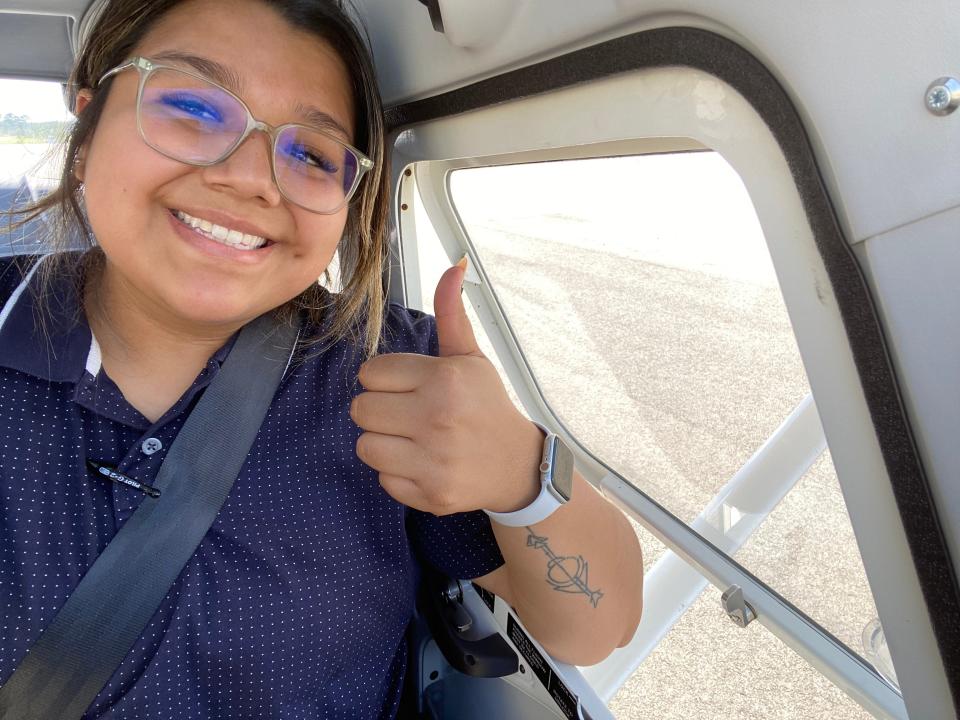
Hales likes to think his program doesn’t waste time.
"For us, as soon as the drop-add period is over, that's when we start flight training,” he said, noting many aviation programs don’t have students in flight until their sophomore year. “And then it's full throttle."
Students must keep a minimum semester GPA of 2.75, remaining in good standing, or they might be pulled from their flight training schedule. Hales said he feels the need to “guard the gate” with a rigorous program, while still aiming at its core to give opportunities to underprivileged students or those who may never have found access to aviation.
“Ultimately, if you get on an airplane and you happen to pass the pilots in the cockpit or standing there, and you see one has a DSU lanyard on... I want you to be able to say, ‘You know what, I'm safe. I can sit in the back of that airplane and actually go to sleep in comfort,’” Hales said.
Historically, he knows the program has struggled to spread the word.
“So that's probably true — it’s the best-kept secret in the state of Delaware — but I'm trying to change that,” Hales said. “I want our students and potential students to know this is an opportunity.”
Because they’re getting jobs.
Expanding on a legacy
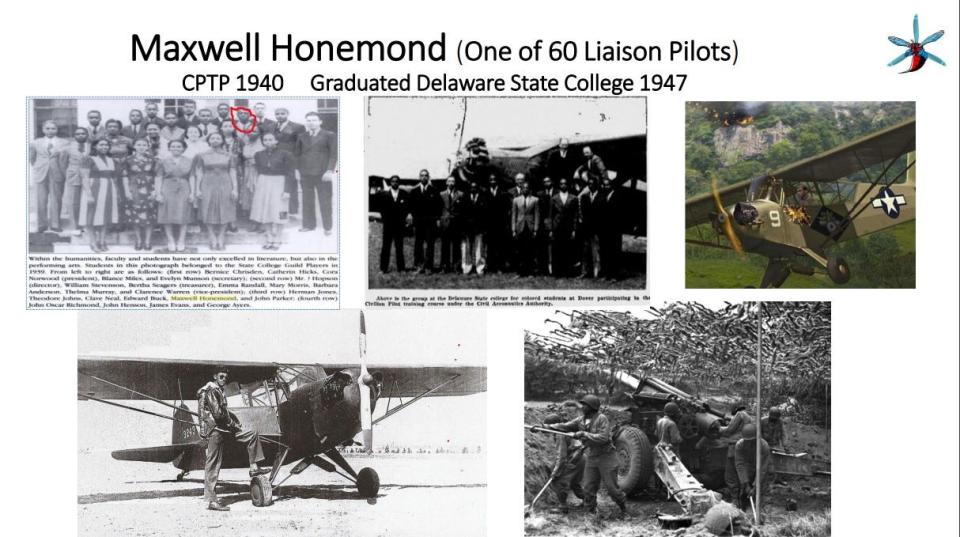
More than 80 fellow Tuskegee Airmen died overseas, but Maxwell Honemond came home.
The graduate of Delaware State Class of 1947 left the armed forces, however — so the racism of 1950s America would bar him from continuing any other career as a pilot, Hales said. He worked for the U.S. Post Office and later as an educator.
Hales still loves telling Honemond's story, he said, sinking into a boardroom chair in the Daniel E. Coons Hangar after a brief history lesson. His iPad screen still showed one of Honemond’s report cards and photos from the ‘40s.
Today at least, he gets to share another ending. “Airlines are leaning on our students,” he said.
Alaska Airlines recruited Evan Knox through its True North development program, partnered with the university. In 2021, United Airlines announced a partnership with DSU, marking its goal to train 5,000 new pilots by 2030 and have at least half be women or people of color.
Eliana Rothwell will be one of them. In a few years, she’d love to find herself behind a 787 Dreamliner.
In 2022, a retired United Airlines pilot and his wife made a $100,000 donation to support flight training at Delaware State. It was the largest cash donation in the 37-year history of the program, thanks to Bob and Karen Fischer of Lewes.
Taking to the sky: We took the first flight on Avelo from New Castle Airport. Here's what it was like.
ICYMI: Delaware State drops campus safety coalition NDAs amid pressure: 'We went too far'
A favorite regional airline for students starting their careers or seeking internships, Republic Airways made a $30,000 contribution in 2022. Piedmont Airlines sparked another regional partnership, offering students a streamed path to American Airlines. One Delaware State alumni chapter in Florida has begun to sponsor students.
All of these links have helped to offset student flight lab fees.
In 2019, a $3.4 million grant from the Delaware Higher Education Economic Development allowed the outfit to purchase 11 planes — 10 Vulcanair V1.0 single-engine aircraft and one twin-engine Piper Seminole.
Hales knows more will be needed.
“I foresee we'll have a bottleneck in our multi-engine flight training,” Hales said, already eyeing another plane with two engines to join five in his own fleet of Red Tails. “That's an example of trying to see down the road, so to speak, what could be friction points in our aviation training.”
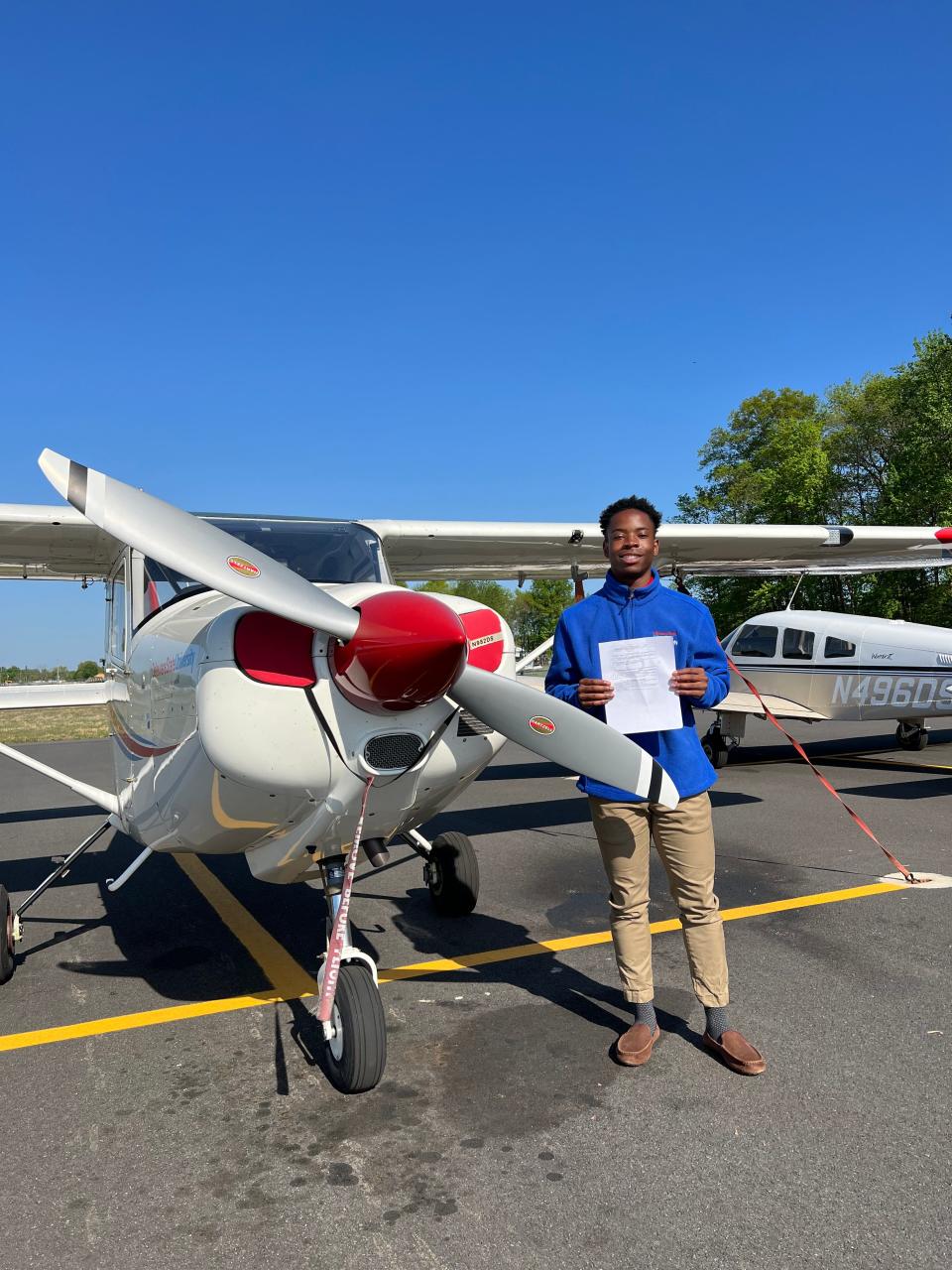
A shortage of instructional personnel and needed improvements in facilities join his list. Many program graduates already return to Delaware State to work as flight instructors, gathering the needed hours to step up as a regional airline pilot.
Hales wants stable growth. It’s easy to imagine the pressure of legacy.
“I'd never been around an organization that was so steeped in that history and lineage before — that really hadn't even known about it itself, and didn't publicize it,” Hales said.
The possibilities pulled him in, after over two decades of career with the Army, much of it overseas.
“We're competing against much larger aviation programs, and we're doing things that they aren't doing,” Hales said. “And that's what really drew me to this position. And it still draws me: the potential.”
Have a story to tell? Kelly Powers covers race, culture and equity for the USA TODAY Network's Northeast Region and Delaware Online, with a focus on education. Contact her at kepowers@gannett.com or (231) 622-2191, and follow her on Twitter @kpowers01.
This article originally appeared on USA TODAY NETWORK: From Tuskegee Airmen, to commercial airline pilots: DSU aviation grows

